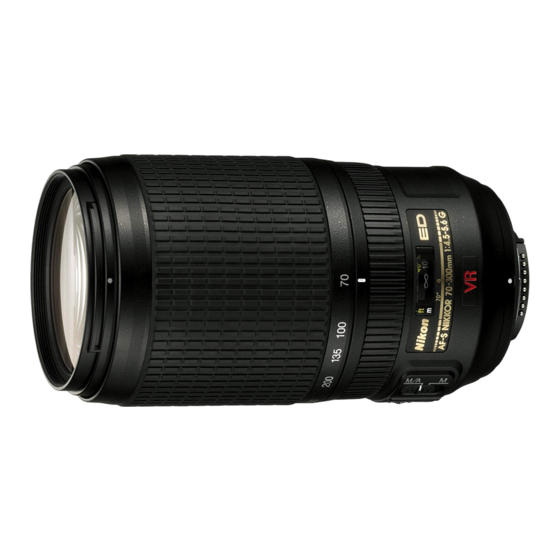
Nikon AF-S VR Zoom-Nikkor 70-300mm f/4.5-5.6 IF-ED Instruction Manual
Hide thumbs
Also See for AF-S VR Zoom-Nikkor 70-300mm f/4.5-5.6 IF-ED:
- Instruction manual (93 pages) ,
- User manual (96 pages) ,
- Brochure & specs (18 pages)
Table of Contents
Advertisement
Quick Links
Advertisement
Table of Contents

Summary of Contents for Nikon AF-S VR Zoom-Nikkor 70-300mm f/4.5-5.6 IF-ED
- Page 1 AF-S VR Zoom-Nikkor 70-300mm f/4.5-5.6 IF-ED 使用説明書 (P.4 – 13) Instruction Manual (PP.14 – 23) Bedienungsanleitung (S. 24 – 33) Manuel d'utilisation (P. 34 – 43) Manual de instrucciones (PP. 44 – 53) Manuale di istruzioni (PP. 54 – 63) (P.
- Page 2 ACTIVE...
- Page 3 ACTIVE NORMAL 15 12 10 NORMAL ACTIVE...
-
Page 4: Notes On Safety Operations
Touching the internal parts of the camera or lens could result in injury. Repairs should be performed only by qualified technicians. Should the camera or lens break open as the result of a fall or other accident, take the product to a Nikon-authorized service En En representative for inspection after unplugging the product and/or removing the battery. - Page 5 F-401x/N5005*, F-401s/ N4004s*, F-401/N4004* F-801s/N8008s*, F-801/N8008*, F-601 /N6000* F3AF, F-601/N6006*, F-501/ N2020**, Nikon MF cameras (except F-601 /N6000*) : Possible : Impossible *Sold exclusively in the USA. **Sold exclusively in the USA and Canada. *1 P includes AUTO (General-Purpose Program) and Vari-Program System.
- Page 6 D2-Series and D50, the lens’ picture angle becomes 22°50’- 5°20’ and its 35mm equivalent focal length range is approx. 105mm -450mm. • If the lens mount rubber gasket " is damaged, be sure to visit the nearest Nikon authorized dealer or service center for repair.
- Page 7 2. Focusing Set your camera’s focus mode selector according to this chart. Lens’ focus mode Camera’s Cameras focus mode D2-Series, D1-Series, D200, D100, Manual focus D70-Series, D50, F6, F5, F4-Series, Autofocus with (Focus assist F100, F90X/ N90s*, F90-Series/N90*, (C / S) manual priority is available.) F80-Series/N80-Series*,...
-
Page 8: Vibration Reduction Mode (Vr@)
IThe effects of vibration reduction Pictures can be taken at shutter speeds approx. 4 stops* slower than is possible without using a VR2 lens.(*Under Nikon measurement conditions. The effects of vibration reduction vary depending on individual and shooting conditions.) ISetting the vibration reduction ON/OFF switch Indicator 1 Set the Vibration reduction ON/OFF switch ( to [ON]. -
Page 9: Focusing, Zooming, And Depth Of Field
For cameras with TTL metering, there is no need to adjust the aperture. Likewise, for TTL auto flash photography with Nikon Speedlights, no adjustment is required. When using a separate exposure meter or taking photographs in the non-TTL flash mode, select the appropriate aperture value according to the focal length setting as displayed on the camera. -
Page 10: Setting The Aperture
6. Setting the aperture Set the aperture on the camera body. 7. Using bayonet hood HB-36 1 IAttaching the hood Align the lens hood attachment index ( on the hood (either one of the two indexes) with the lens hood mounting index on the lens, and turn the hood clockwise until it click stops to secure. -
Page 11: Recommended Focusing Screens
9. Recommended focusing screens Various interchangeable focusing screens are available for certain Nikon SLR cameras to suit any picture-taking situation. The ones recommended for use with this lens are: Screen EC-B G1/G2 EC-E G3/G4 Camera ◎ ◎ ― ◎ ―... -
Page 12: Standard Accessories
10. Lens care • Clean the lens surfaces with a blower brush. To remove dirt and smudges, use a soft, clean cotton cloth or lens tissue moistened with ethanol (alcohol) or lens cleaner. Wipe in a circular motion from center to outer edge, taking care not to leave traces or touch other parts of the lens. -
Page 13: Specifications
14. Specifications Type of lens: G-type AF-S Zoom-Nikkor lens with built-in CPU and Nikon bayonet mount Focal length: 70mm–300mm Maximum aperture: f/4.5–5.6 Lens construction: 17 elements in 12 groups (2 ED lens elements) Picture angle: 34°20’-8°10’ [22°50’-5°20’ with Nikon digital cameras (Nikon DX format);...













Need help?
Do you have a question about the AF-S VR Zoom-Nikkor 70-300mm f/4.5-5.6 IF-ED and is the answer not in the manual?
Questions and answers